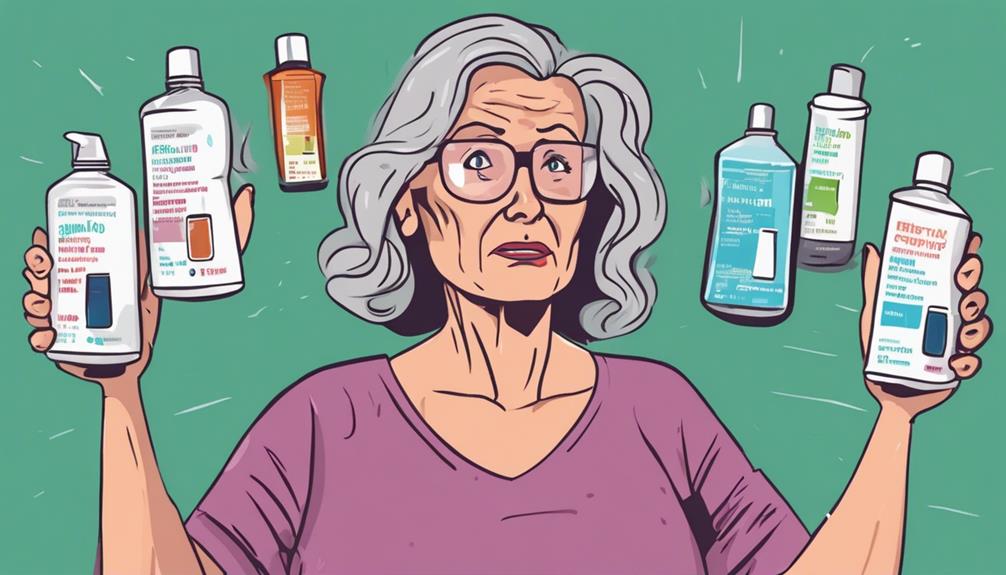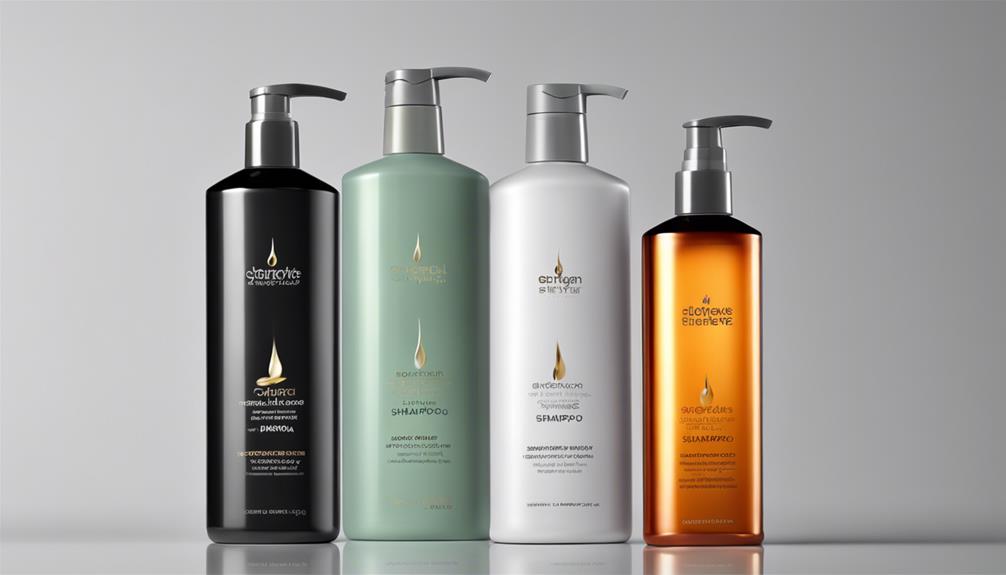When it comes to managing greasy hair during menopause, selecting the right shampoo is essential for maintaining a healthy scalp and combating excess oil. With a plethora of options available in the market, it can be overwhelming to find the perfect match for your specific needs. However, by understanding key ingredients and their benefits, you can make an informed decision that will help you tackle greasiness effectively. So, what exactly should you look for in a shampoo to address greasy menopausal hair? Stay tuned to discover the best solutions for your hair care routine.
Key Takeaways
- Look for shampoos with tea tree oil or salicylic acid to regulate sebum production.
- Choose clarifying shampoos to remove excess oil buildup.
- Consider products with peppermint oil for scalp health.
- Opt for formulas with witch hazel or clay to absorb oil.
- Prioritize shampoos like Paul Mitchell Tea Tree Special or Neutrogena Anti-Residue for oily hair.
Understanding Greasy Hair in Menopause

If you're experiencing greasy hair during menopause, understanding the underlying causes can help you manage this common issue effectively. Hormonal changes play a significant role in greasy hair during menopause. As estrogen levels decrease, testosterone can have a more dominant effect, leading to an increase in sebum production. This excess sebum can make your hair look oily and unwashed even shortly after washing it.
Aside from hormonal shifts, stress can also exacerbate greasy hair. During menopause, stress levels can be higher due to various factors like hot flashes, mood swings, and sleep disturbances. This increased stress can stimulate the sebaceous glands to produce more oil, contributing to greasy hair.
Furthermore, changes in diet and lifestyle can impact the condition of your hair during menopause. Consuming a diet high in sugar and unhealthy fats can influence sebum production, potentially leading to greasier hair. Lack of proper hydration and not using the right hair products can also worsen the greasiness.
Understanding these underlying causes can guide you in choosing the best shampoo to manage greasy hair effectively during menopause.
Key Ingredients to Look For
Consider incorporating essential oils, such as tea tree oil or peppermint oil, into your shampoo for greasy menopausal hair to regulate sebum production and maintain scalp health. These oils have natural properties that can help balance oil levels on the scalp, keeping your hair fresher for longer periods. When choosing a shampoo, look for ingredients like salicylic acid, which can exfoliate the scalp and unclog pores, preventing excess oil buildup. Additionally, ingredients like witch hazel or clay can help absorb excess oil, leaving your hair feeling lighter and cleaner.
| Key Ingredient | Benefits | Recommended Products |
|---|---|---|
| Tea Tree Oil | Regulates sebum production | Shampoo A |
| Peppermint Oil | Maintains scalp health | Shampoo B |
| Salicylic Acid | Exfoliates the scalp, prevents oil buildup | Shampoo C |
Top Shampoos for Greasy Hair

Look for shampoos specifically formulated for greasy hair to effectively address excess oil and maintain scalp health. When choosing a shampoo for greasy hair, look for products that contain clarifying ingredients such as tea tree oil, salicylic acid, or charcoal. These ingredients help to deep clean the scalp, removing excess oil and buildup.
One popular choice for greasy hair is the Paul Mitchell Tea Tree Special Shampoo. This shampoo contains tea tree oil, which has antibacterial properties that can help balance oil production on the scalp.
Another option is the Neutrogena Anti-Residue Clarifying Shampoo, which is designed to remove up to 90% of dulling residue caused by other shampoos.
If you prefer a more natural option, consider trying the Briogeo Scalp Revival Charcoal + Coconut Oil Micro-exfoliating Shampoo. This shampoo uses charcoal to draw out impurities and excess oil while coconut oil helps to nourish and hydrate the scalp.
Remember to choose a shampoo that suits your hair type and scalp condition to effectively combat greasy hair.
Tips for Washing Menopausal Hair
How can you adjust your hair washing routine to effectively care for menopausal hair?
Menopausal hair requires special attention due to changes in hormones, which can affect the scalp's oil production. Here are some tips to help you maintain healthy hair during this stage of life:
- Choose the Right Shampoo:
Opt for a clarifying shampoo to remove excess oil and buildup without stripping your hair of essential moisture.
- Wash Less Frequently:
Washing your hair too often can strip it of natural oils, leading to increased oil production. Try washing every 2-3 days instead.
- Focus on the Scalp:
When shampooing, concentrate on massaging the scalp to stimulate blood flow and promote hair health.
- Use Lukewarm Water:
Hot water can strip your hair of its natural oils, while cold water may not effectively clean. Stick to lukewarm water for a gentle cleanse that won't dry out your hair.
Maintaining Hair Health Post-Menopause
To maintain peak hair health post-menopause, prioritize using hydrating hair masks once a week. Menopausal changes can lead to dry, brittle hair, making hydration essential for maintaining hair health. Incorporating a hydrating mask into your weekly routine can help replenish moisture, improve hair elasticity, and prevent breakage.
In addition to regular hydrating masks, consider using a sulfate-free shampoo and conditioner. Sulfates can strip the hair of its natural oils, exacerbating dryness and causing further damage. Opt for products that are gentle and nourishing to keep your hair healthy and hydrated.
Trimming your hair regularly can also promote hair health post-menopause. Split ends and breakage are common as we age, so getting rid of damaged ends can prevent further issues and keep your hair looking and feeling its best.
Lastly, maintaining a balanced diet rich in vitamins and minerals, staying hydrated, and protecting your hair from heat styling tools can all contribute to the overall health and appearance of your hair post-menopause. By implementing these simple habits, you can help your hair stay strong, shiny, and beautiful.
Conclusion
To sum up, finding the right shampoo for greasy menopausal hair is essential for maintaining scalp health and managing excess oil production.
Look for shampoos with tea tree oil, salicylic acid, or charcoal to effectively cleanse the scalp and balance sebum levels.
By incorporating these key ingredients into your hair care routine, you can keep your hair feeling fresh and clean throughout menopause.